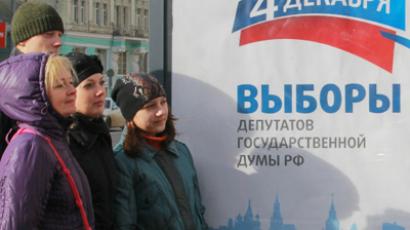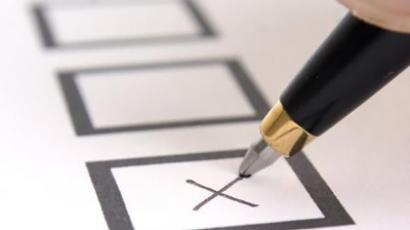Parliamentary parade: Russian Duma as it stands
The December 4 elections will decide who will make up the State Duma - the lower chamber of the Russian parliament, where laws are adopted and all bills are first reviewed.
The plethora of election campaign posters and billboards around the city leaves no doubt that it is election time in Russia!The ongoing election will determine the make-up of the sixth Duma since 1993.The term Duma comes from the Russian “dumat” meaning “to think”. Compared to some European democracies, the Russian Duma is quite a youngster. Founded in 1906, it did not survive the 1917 Revolution. But it bounced back in 1993, when Russia’s first president, Boris Yeltsin, introduced a new constitution.There are 450 seats up for grabs in the Russian State Duma. The elected deputies will serve for five years, following constitutional amendments in 2008 that increased the term duration from four years.The State Duma is currently divided between four political parties.The majority in the Duma is held by the United Russia Party, currently holding 315 seats. The next biggest party is that of the Communists, with 57 seats. The Liberal Democrats and Fair Russia hold 40 and 38 seats respectively.The ruling United Russia Party holds a constitutional majority in the parliament and is led by Prime Minister Vladimir Putin.In the upcoming election, President Dmitry Medvedev will be at the top of the party’s list of candidates. Vladimir Putin is not standing in this election, as he will contest the presidential poll in March next year.The party’s representation in the Duma is not only made up of career politicians, but celebrities as well, such as one of the most decorated gymnasts in the history of rhythmic gymnastics, two-time Olympic medalist Alina Kabayeva, as well as former NHL star Slava Fetisov and the first man to walk in space, Aleksey Leonov.The party's platform essentially revolves around modernizing the economy, uprooting corruption and anti-radicalism.However, United Russia is often criticized as bureaucratic, inefficient and is to some extent blamed for political and economic stagnation.The Communist Party is headed by its unchallenged leader Gennady Zyuganov, who has been at the helm since the party’s founding in 1993. The Communists are the biggest opposition force in the country, constantly in second place.One of the Communists’ most prominent deputies is Zhores Alferov, Nobel laureate in physics in 2000. The Communist Party promises – not for the first time – the nationalization of key industries, such as raw materials production, metallurgy, aviation, and the electric power industry.They are often criticized for sticking to a platform that caters to an elderly constituency still dreaming of returning to the glory days of the Soviet Union.Another old-timer of the Russian State Duma is Vladimir Zhirinovsky. He is the leader of the third largest party, the Liberal Democratic Party of Russia (LDPR). It is often called a one-man party. Zhirinovsky is widely considered to be a showman and is known for his eccentric behavior and sometimes shocking political views. For example, he advocated forcibly retaking Alaska from the US and has openly expressed his hatred of certain ethnic groups.Apart from that, Zhirinovsky often turns his words into action.On a lighter note, since wrestling champion Aleksandr Karelin was elected as a United Russia deputy, there have been no more brawls in the State Duma.Fair Russia is headed by Sergey Mironov. As the name implies, its platform is based on the principles of fairness, freedom and solidarity, calling for a proper functioning welfare state.A usual working place of a deputy in the State Duma has no bells and whistles, just a chair, a microphone and a device with which to vote. But not all deputies are interested in the daily debates over bills. Last year, a huge scandal emerged when it came to light that some deputies consistently missed sessions and simply ask their party colleagues to vote in their absence. This resulted in the comical spectacle of deputies running around the chamber pressing their colleagues’ voting buttons.Only after public criticism from the president did they return to work.Despite the shortcomings of Russia’s politicians, there are still hopes that the country will be able to put together the kind of government it needs to address its people’s demands and navigate Russia’s future.So who exactly will be filling those 450 seats of the State Duma? It will not be long now until we find out.













